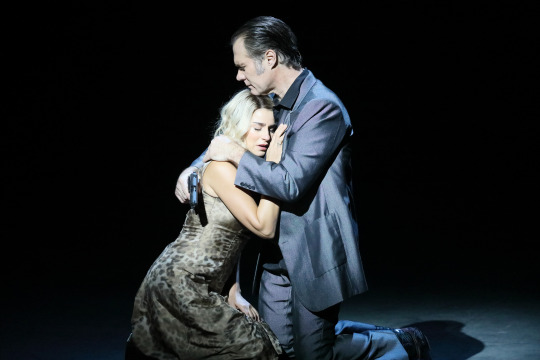#victoria karkacheva
Text
Bayerische Staatsoper - Pikowaja Dama
Foto ©Wilfried Hösl
Non ho difficoltà ad ammetterlo: anche se amo alla follia Pikowaja Dama, che considero uno tra i capolavori assoluti del teatro d’ opera ottocentesco,
Continue reading Bayerische Staatsoper – Pikowaja Dama

View On WordPress
#asmik grigorian#aziz shokakimov#bayerische staatsoper münchen#bayerische staatsorchester#boris pinkhasovic#brandon jovanovich#canto#critica#münchen#opera#roman burdenko#teatro#tschaikowsky#victoria karkacheva#violeta urmana
1 note
·
View note
Text
LICEU 2022/2023: LA 3a de MAHLER
Diumenge 2 d’abril de 20w3. Gran Teatre del Liceu, 3a simfonia de Mahler. Fotografia IFL
L’orgull d’escoltar una orquestra de qualitat al Liceu i que aquesta sigui l’orquestra de la casa, és immens, perquè hem passat per una travessa llarga plena d’entrebancs, dubtes, crítiques justes i injustes i el permanent descrèdit que alguns i algunes en el teatre i a les xarxes han volgut tacar aquesta…

View On WordPress
#Òscar Boada#Cor Vivaldi#Gustav Mahler#Josep Pons#Orquestra i Cor del Gran Teatre del Liceu#Pablo Assante#Victoria Karkacheva
1 note
·
View note
Text
JULES MASSENET'S WERTHER AT LA SCALA, JULY 2, 2024
You won’t need a full stream-of-consciousness transcription covering the entire trip. I’m just positive that, few steps into my way home as a genuinely happy camper, I was essentially saying to myself, OK, that was Ibsen. It was everywhere. Also, you know, there was that specific Hedda Gabler something: the towering female lead, the guns… Henrik Ibsen. After I spent several hours in the clutches of Morpheus, those two words—Henrik and Ibsen—weren’t going anywhere, so I decided to check some data, and here’s what I found out: Hedda Gabler—1891; Werther—1892. That’s more than enough for me to glow with serious pride, and be like, hey, maybe I’m not drifting into complete nonsense… I’ll give you a reliable synopsis to begin with. Werther falls in love with Charlotte. It looks like Charlotte might be somewhat interested in Werther, as well; yet she’s already set to marry Albert. (She’s not that free to decide either, given she promised her dying mother she would marry Albert). Somewhere in the void between Act I and Act II, Charlotte does marry Albert. How is Werther going to cope? I’d say Christof Loy’s production of Werther (whose sets/costumes/lights were designed by Johannes Leiacker, Robby Duiveman, and Roland Edrich) was almost exclusively focused on putting in front of the audience a group of perfectly realistic (but I could say: real) humans. It started from the supporting characters (the troop of children [Charlotte has like, seven younger siblings], the regular visitors…) and it went all the way to the protagonists. You could pick anybody, I promise, and I’ll simply launch into a long, detailed disquisition on his/her personality, feelings, fears, dreams… (I believe that’s a symptom of good storytelling).
Another crucial trait of the staging was this: there was a giant core, a center of attraction that dominated everything and everybody. And that center of attraction was Charlotte. In the universe of this Werther, people are solely defined by the way they relate to Charlotte. Veneration appears to be omnipresent. Then, you may have curiosity; envy; emulation; suspicion; lust… Charlotte herself—as portrayed by Victoria Karkacheva through her overly dark, bewitching, regally deadpan voice—was unquestionably the woman in charge. You could describe her as a deft puppeteer, and a bit of an autocrat. But also as a bored/lonely muser. Ultimately, a glacial enigma. (To me, she was definitely reminiscent of Alida Valli in Alfred Hitchcock’s The Paradine Case [1947]). As for Werther, Benjamin Bernheim depicted the most obedient (if awkwardly elegant) slave you’ll ever meet. A peculiar being that might be half Giacomo Leopardi, half the guy who—out of desperate love—butchers himself right between Salome and Jochanaan (and goes completely unnoticed in the process. Why yes—his name was Narraboth). While the Ossianic poem («Pourquoi me réveiller, ô souffle du printemps» [Act III]) shone like a precious one-of-a-kind gem, his measured singing made for a great listening experience throughout. Finally, Alain Altinoglu and the orchestra were the (not so) hidden engine that turned this Werther as a whole into the bewildering exploration of the interior life of a handful of individuals. There was no shortage of musical gifts: shimmering strings, creamy brass (is that a thing?), extended, convoluted/expressionist solos… Still, the truly critical feat was the uninterrupted flow of the narration: bar after bar, tone after tone. It was riveting end to end—even if the action was all but confined to the most secretive part of few tormented souls. Did I mention it made me think of Henrik Ibsen?
0 notes